Introduction to Veganism
The Vegan Society defines Veganism as “a way of living that seeks to exclude, as far as is possible and practicable, all forms of exploitation of, and cruelty to, animals for food, clothing or any other purpose.”
The world is going vegan because every single day more and more people are waking up to a truth that our use of animals – whether to experiment upon, to work, for entertainment, as pets, for products or as sources of food – is actually their abuse.
We know that like us, whether they can fly, swim or walk, all animals enjoy the freedom of movement – something that is taken away from a human only as a form of punishment if guilty of a crime. Yet to the innocent animals we use, we grossly violate this basic right by keeping them restrained with ropes and chains or confined in cages, tanks, sheds and other such enclosures.
We know that like us, be it birds, fishes or land animals, all animals have an intrinsic value of their own lives wherein they communicate, bond, make homes, have babies and so on. Yet to the helpless animals we use, we unapologetically deny them everything that is natural to them – their natural habitat, their natural activities, their natural families and even their natural death.
We know that like us, whether they have feathers, fins, fur or nothing, all animals are sentient beings who have the ability to feel and perceive. Yet to the vulnerable animals we use, we routinely inflict upon them unimaginable physical, sexual, mental and emotional pain.
We victimise not only the wild animals, but the billions and billions of laboratory, pet, domestic and other animals we purposely breed into existence year after year so that they are never in short supply.
It is time we all looked beyond societal conditioning to realise that to use animals against their will and without their consent and to cause them harm and suffering is in direct conflict with our inherent love, compassion and respect for animals and our core values of ahimsa and justice towards all living beings. It is time we must align our actions with our nature. The least we can do is to go vegan.
Being vegan is not so difficult. It simply means to select cosmetics, toiletries and household products not tested on animals and without animal derived ingredients, say no to the use of animals for experimentation, work and entertainment, opt to adopt but not buy animals as pets, choose cruelty free alternatives to leather, wool, silk, honey and other animal based products, and switch to plant-based substitutes for flesh, eggs and animal milk in diet.
With veganism growing fast and vast, there is enough information out there to help anyone go vegan.
Methods of Vegan Advocacy
Never doubt that a small group of thoughtful, committed, citizens can change the world. Indeed, it is the only thing that ever has.
Margaret Mead
Advocating for veganism has never been so imperative and easy as it is now. Being vegan is just not enough. It is our moral obligation to spread the philosophy and practice of veganism as much as we can.
These are some tried and tested methods of vegan advocacy that work very well. While, of course, there are thousands and thousands of people across the world doing a great job, a few have been mentioned to get an idea as to how capable anyone can be to take up any form of activism.
Clothes and Accessories
Wearing clothes or carrying accessories with vegan messages are a good start to get noticed and raise interest.
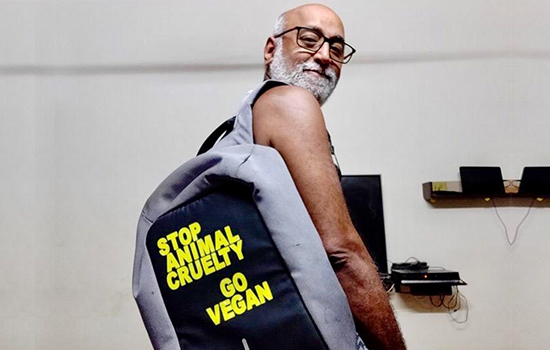
Leafleting
Handing out leaflets is the most efficient way to reach out to the largest number of people in the shortest period of time.
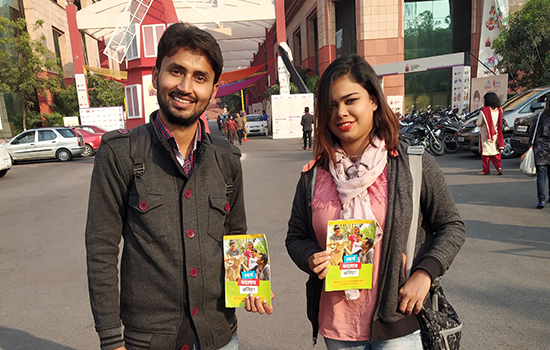
Conversing
Striking a meaningful conversation with strangers during a walk or while travelling is so simple yet it holds the potential of drastic change both in their perceptions and way of living.
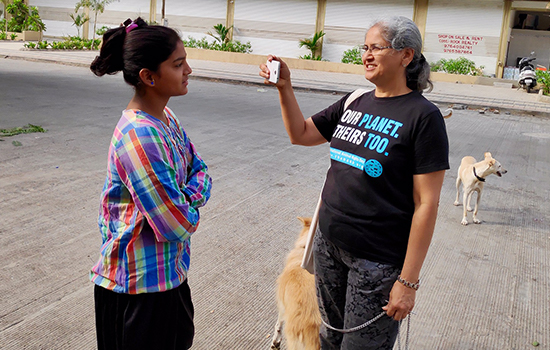
Posters and Banners
Holding or putting up posters or banners at strategic locations is bound to attract people and help spread the word.
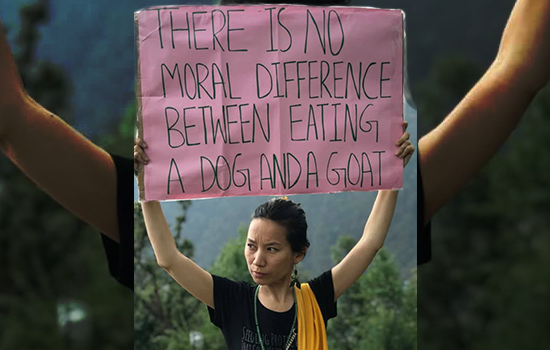
Video Outreach
Showing graphic videos on the phone, tablet or any device has the potential to change hearts and habits.
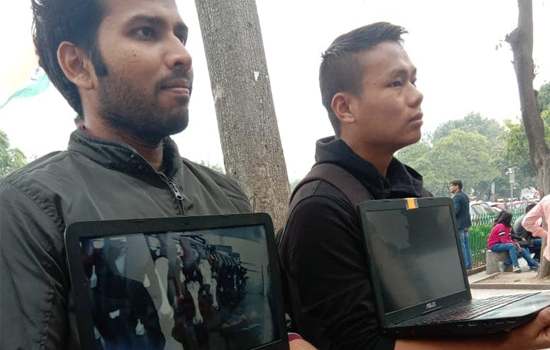
Chalktivism
Writing a few words or making simple images with chalk on any possible surface is cost free yet very effective in creating awareness.
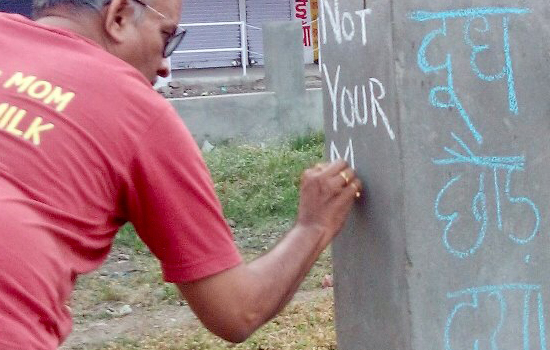
Wall Art
Painting a wall with prior permission is a beautiful idea because art can speak louder than words and lasts longer.
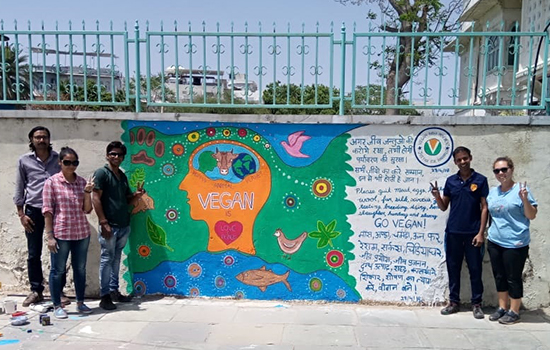
Tabling
Placing a table in a stall or otherwise with assorted outreach material is a great way to catch attention and strike meaningful conversations.
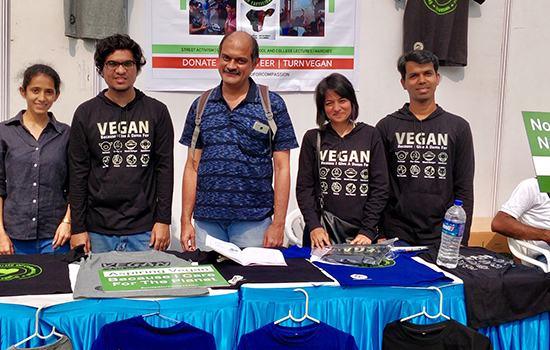
Marching
Whether a silent, candle or a march with sloganeering, walking in unison sends a strong message of solidarity and seriousness of the issue at hand.
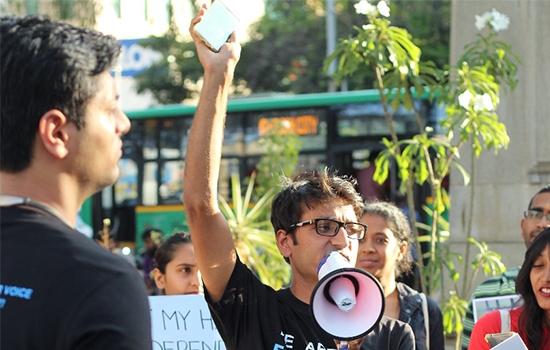
Disruption
Direct Action Everywhere (DXE) is a form of nonviolent direct action worldwide where activists go inside places of violence and speak up on the behalf of the animals highlighting their systematic abuse and bring the issue of animal rights on the table.
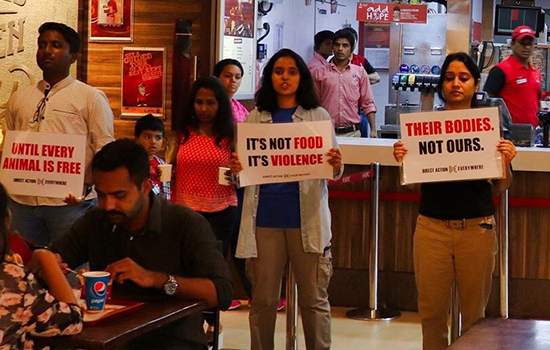
Eateries and Grocery Stores
It is very important that to be vegan in diet, people should easily be able to spot vegan friendly eateries and grocery stores and be able to identify their 100% plant based foods and beverages. It is equally important that eateries and grocery stores increase their vegan options. To make spotting and identification easy, we need to encourage eateries and grocery stores to display stickers, placards and other relevant material. To motivate eateries and grocery stores to increase their vegan options, one important aspect is to make them aware of plant based substitutes and help connect them to such producers and sellers.
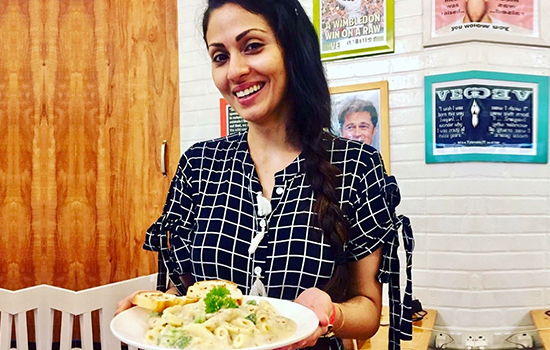
Demonstrations and Tasting Sessions
Since for many people being vegan in diet means to give up on convenience, health and taste, it is well worth the effort to hold demonstrations or tasting sessions on how plant based alternatives for flesh, eggs, milk and honey are not only easy to make, easy to buy and easy to use, but can very well satisfy taste buds and any nutritional requirements.
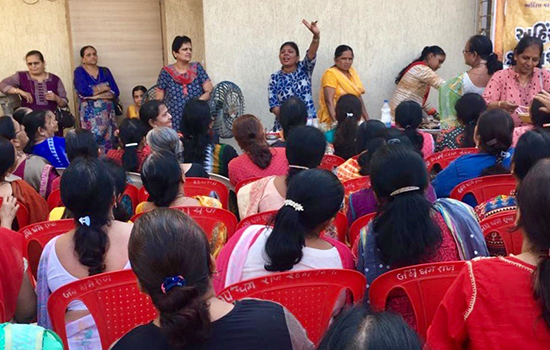
PowerPoint Presentations and Talks
A crisp Power Point Presentation or talk followed by an interactive session can surely help the audience look beyond societal conditioning and make independent and informed decisions.
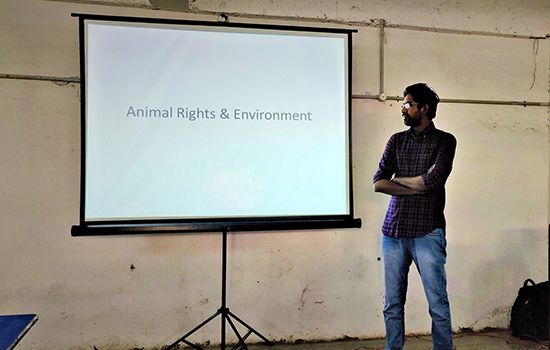
Single Issue Campaigns
Single-issue campaigns at regular intervals keep the interest alive and plant the seeds of compassion and respect for animals in the minds of the young and old.
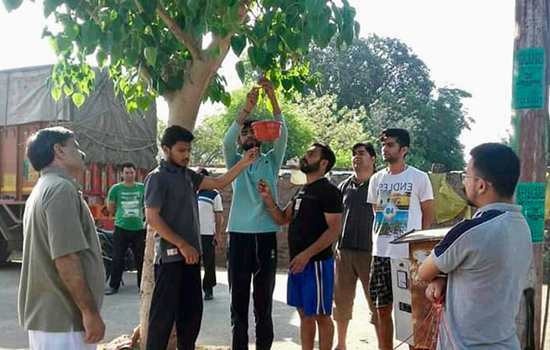
Events
From local and national events initiated by organisations or a group of grass root activists to international events, hosting each one is an opportunity to become a part of the larger picture.
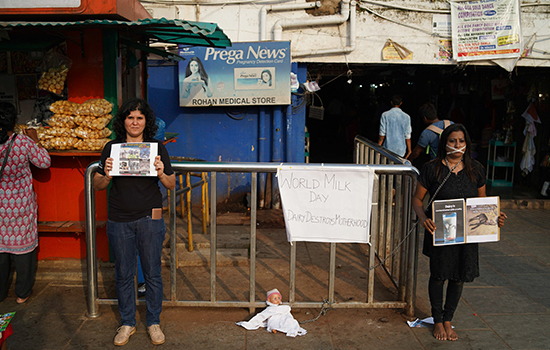
Building base
Getting the right experts, influencers and people with a large following on board helps expand audience base considerably.

Internet Activities
Be it messaging through WhatsApp, social networking through LinkedIn, micro blogging through Twitter, photos through Instagram, links through Facebook or videos on YouTube, so much information can be spread simply at the click of a button.

Media coverage
Getting the media to cover an outreach activity adds value and greatly helps increase public awareness.
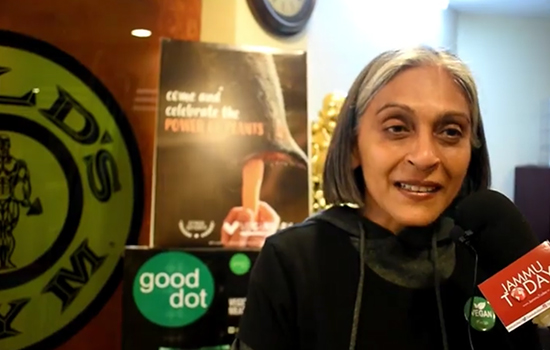
Letters
Sending letters to the editors of newspapers, principals of educational institutions and other heads seeking attention to a matter can have a far reaching impact in bringing about change.

COLUMN, ARTICLES AND BLOGS
Newspapers, magazines and the internet are great spaces to share knowledge, experiences, views and thoughts knowing that the reach can be phenomenal and the change drastic.
As she so wanted to share all that she herself was learning about animal suffering and veganism, Malvika used her communication skills to start writing a weekly column in the Greater Jammu newspaper in December 2014. Having changed the format, the column is now a Q&A space that she has named VEGYAN – BE VEGAN & WISER WITH MALVIKA KALRA. BLOGS contains the content of all the columns and articles that she has written so far.
Tips
- Keeping in touch with organisations that work in this field helps since organisations provide plenty of material and opportunities for effective activism.
- Attending conferences, boot camps and other such get togethers are necessary as they become great opportunities to meet other activists and learn more.
- Joining relevant Facebook groups, following accomplished and fellow activists on Instagram or just watching veganism related videos on YouTube, all just assist in keeping the morale up.
- Taking short breaks from activism become important in overcoming compassion fatigue if the work involved is overwhelming.
- Updating oneself with relevant knowledge proves worthwhile because one remains well informed and confident at all times.